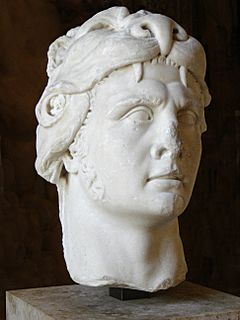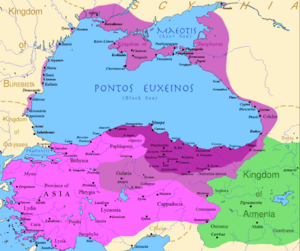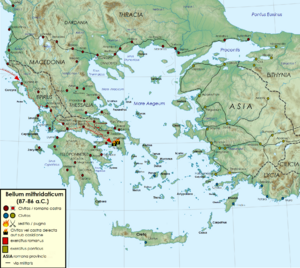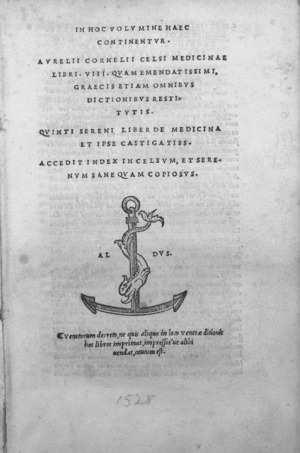Mithridates VI Eupator facts for kids
Quick facts for kids Mithridates VI |
|||||
|---|---|---|---|---|---|
| King of Kings | |||||

Bust of Mithridates in the Louvre
|
|||||
| King of Pontus | |||||
| Reign | 120–63 BC | ||||
| Predecessor | Mithridates V Euergetes | ||||
| Successor | Pharnaces II of Pontus | ||||
| Born | 135 BC Sinope, Kingdom of Pontus (modern-day Sinop, Turkey) |
||||
| Died | 63 BC (aged 71–72) Panticapaeum, Kingdom of Pontus (modern-day Kerch, Crimea) |
||||
| Burial | either Sinope or Amaseia, Kingdom of Pontus (modern-day Sinop or Amasya, Turkey) |
||||
| Spouse |
|
||||
| Issue Detail |
|
||||
|
|||||
| Dynasty | Mithridatic | ||||
| Father | Mithridates V Euergetes | ||||
| Mother | Laodice VI | ||||
Mithridates VI Eupator (born 135 BC, died 63 BC) was a powerful king of the Kingdom of Pontus. This kingdom was located in northern Anatolia, which is modern-day Turkey. He ruled from 120 BC to 63 BC.
Mithridates was one of the toughest enemies the Roman Republic ever faced. He was a very ambitious and strong leader. He wanted to control a large area around the Black Sea and in Asia Minor. He fought several long wars against Rome, known as the Mithridatic Wars. His goal was to stop Rome from taking over his region.
He is often called Mithridates the Great. He was also famous for trying to make himself immune to poisons. He would take small, harmless amounts of poison regularly. This practice is now called mithridatism, named after him.
Contents
Mithridates' Early Life and Rise to Power
Mithridates Eupator Dionysus was a prince with both Persian and Greek family roots. He was born in the city of Sinope, on the Black Sea coast. He grew up in the Kingdom of Pontus.
His father, Mithridates V Euergetes, was the king of Pontus. His mother, Laodice VI, was a princess from the Seleucid kingdom. In 120 BC, his father was poisoned and died. Mithridates V left the kingdom to his wife, Laodice VI, and their two sons, Mithridates VI and his younger brother.
Since Mithridates and his brother were too young, their mother, Laodice VI, became the ruler. She ruled Pontus from 120 BC to about 116 BC. During this time, she seemed to favor Mithridates' younger brother. Mithridates had to go into hiding to stay safe from plots against him.
Between 116 and 113 BC, Mithridates returned to Pontus. He was a strong and smart young man by then. He took control of the kingdom, removing his mother and brother from power. He became the sole ruler of Pontus. To make his claim to the throne stronger, he married his younger sister, Laodice.
Expanding the Kingdom
Mithridates wanted Pontus to be the most powerful state around the Black Sea and in Anatolia. He first took control of Colchis, a region east of the Black Sea. This area is now part of Georgia.
He then faced the Scythian king Palacus for control of the Pontic steppe. Important cities in Crimea and the Bosporan Kingdom joined Mithridates. They wanted his protection against the Scythians. After some battles, the Scythians accepted Mithridates as their ruler.
Next, Mithridates looked towards Anatolia, where Roman power was growing. He first worked with King Nicomedes III of Bithynia to divide areas like Paphlagonia and Galatia. However, it soon became clear that Nicomedes was siding with Rome against Pontus.
Mithridates and Nicomedes fought over control of Cappadocia. When Mithridates won, Nicomedes asked Rome for help. Rome stepped in twice (95–92 BC) to help Nicomedes. This made Mithridates realize that he would have to fight Rome if he wanted to keep expanding his kingdom. He decided to try and push the Romans out of Asia.
The Mithridatic Wars Against Rome
The next king of Bithynia, Nicomedes IV of Bithynia, was largely controlled by the Romans. Mithridates tried to remove him, but failed. Nicomedes IV, pushed by Rome, declared war on Pontus.
Rome was busy with its own civil war at the time. So, there were only a few Roman soldiers in Asia. These soldiers joined Nicomedes IV's army and invaded Pontus in 89 BC. Mithridates won a big victory, defeating the Roman-led forces. His armies were welcomed across Anatolia.
In 88 BC, Mithridates ordered a terrible event. Many Roman and Italian settlers in major Anatolian cities were killed. This event is known as the Asiatic Vespers. It greatly reduced the Roman presence in the region.
Mithridates presented himself as a champion of Greek culture. Many Greek cities, including Athens, joined him. His fleet even attacked the Romans at Rhodes. His neighbor, King Tigranes the Great of Armenia, became his ally. Tigranes married Mithridates' daughter, Cleopatra of Pontus. These two kings supported each other against Rome.
Rome responded to the massacre of 88 BC by sending a large army. The First Mithridatic War (88–84 BC) began. The Roman general Lucius Cornelius Sulla pushed Mithridates out of Greece. Sulla had to return to Rome because of political problems. He quickly made a peace treaty with Mithridates. This treaty allowed Mithridates to rebuild his army.
Another Roman general, Lucius Licinius Murena, attacked Mithridates in 83 BC. This started the Second Mithridatic War (83–81 BC). Mithridates defeated Murena's forces. Peace was declared again.
About ten years later, Rome tried to take over Bithynia. Mithridates attacked with an even bigger army. This led to the Third Mithridatic War (73–63 BC). The Roman general Lucullus fought Mithridates. Lucullus defeated the Pontic forces in 72 BC, forcing Mithridates to flee to Armenia.
While Lucullus was fighting in Armenia, Mithridates returned to Pontus. He defeated four Roman legions in 67 BC. However, he was finally defeated by Pompey's legions in 66 BC.
After this defeat, Mithridates escaped to the lands north of the Black Sea. He planned to raise another army to invade Italy. But his plans were too harsh on the local people. His own son, Pharnaces II of Pontus, led a rebellion against him in 63 BC. Mithridates retreated to a fortress and died there. Pompey arranged for Mithridates to be buried in the tombs of his ancestors in Amasia.
Mithridates' Antidote and Poisons
When Mithridates was young, after his father was poisoned, he spent seven years living in the wilderness. He learned to endure hardships. During this time, and after he became king, he tried to make himself immune to poisons. He would regularly take very small, non-deadly doses of poisons, especially arsenic. This practice is now known as Mithridatism.
After becoming king, Mithridates continued to study poisons and create antidotes. He even tested these antidotes on criminals who were sentenced to death. He was said to have developed a complex "universal antidote" against poisoning. He took this antidote every day with cold water. It became known as mithridate or mithridatium.
The original recipe for his antidote is lost. However, some ancient writers like Pliny the Elder mentioned ingredients. One simple recipe found among Mithridates' notes by Pompey included two dried walnuts, two figs, and 20 rue leaves. These were to be crushed and taken with a pinch of salt after fasting.
Roman doctors later created their own versions of Mithridates' antidote. These often contained many ingredients. For centuries, mithridate and a similar remedy called theriac were important in Western and Islamic medicine. People believed they could cure many illnesses. However, by the 19th century, doctors mostly stopped using them.
Mithridates as a Speaker of Many Languages
Mithridates was known for being able to speak many languages. According to Pliny the Elder, Mithridates could speak the languages of all the twenty-two nations he ruled. This skill made him famous as a polyglot, someone who speaks many languages. His name was even used in the titles of later books about different languages.
Mithridates' Family
Mithridates VI had several wives and many children. The names he chose for his children showed his mixed Persian and Greek heritage.
His first wife was his sister, Laodice. They had several sons, including Mithridates, Arcathius, Machares, and Pharnaces II of Pontus. Their daughters included Cleopatra of Pontus and Drypetina. Drypetina was very loyal to her father.
His second wife was a Greek noblewoman named Monime. They had a daughter named Athenais. His other wives included Berenice of Chios, Stratonice of Pontus, and Hypsicratea. Stratonice had a son named Xiphares. Hypsicratea was known for her loyalty and fighting skills.
Mithridates also had children with other women. These children included sons like Mithridates I of the Bosporus, Cyrus, Xerxes, Darius, and Ariarathes IX of Cappadocia. His daughters from other relationships included Cleopatra the Younger and Orsabaris.
When the Roman general Pompey took over the Kingdom of Pontus in 63 BC, many of Mithridates' family members who were still in Pontus died. However, some of his children and his sister were taken to Rome by Pompey to be part of his victory parade.
Cultural Depictions of Mithridates
Mithridates has been featured in many plays, operas, and books.
- The 1673 play Mithridate by Jean Racine tells the story of his death. This play inspired several operas, including one by Mozart called Mitridate, re di Ponto (1770).
- Another opera about him is Mitridate Eupatore (1707) by Alessandro Scarlatti.
- The famous novel The Count of Monte Cristo by Alexandre Dumas mentions the idea of a mithridate (antidote).
- The poet A. E. Housman refers to Mithridates' antidote in his poem "Terence, This Is Stupid Stuff."
- In the novel The Grass Crown by Colleen McCullough, Mithridates' life is described in detail.
- The Last King by Michael Curtis Ford is a historical novel about Mithridates and his battles against Rome.
Images for kids
See also
 In Spanish: Mitrídates VI para niños
In Spanish: Mitrídates VI para niños
- Bosporan Kingdom
- Mithridatism (Mithridatization)
- Mithridatic Wars
- Epistula Mithridatis
- Roman Crimea
 | Madam C. J. Walker |
 | Janet Emerson Bashen |
 | Annie Turnbo Malone |
 | Maggie L. Walker |





